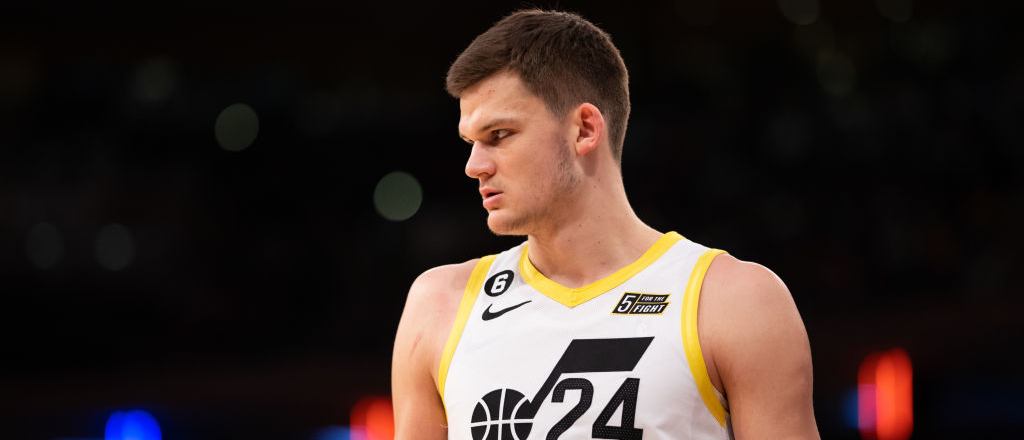There may not have been a bigger surprise in the NBA last season than the Utah Jazz. While most predicted them to be terrible in the immediate aftermath of the trades that saw Rudy Gobert and Donovan Mitchell leave town, Utah competed every night, saw Lauri Markkanen turn into an All-Star, and despite fading down the stretch, laid the groundwork to be a team that competes in the future.
There won’t be any sneaking up on people this season, and it’s easy to predict that Utah will struggle in the ultra-competitive Western Conference. They did, however, earn the benefit of the doubt last year, and even if they take a step back in the win-loss column this year, it’s hard not to be excited about what’s being built in Salt Lake City.
Biggest Question: How Much Better Can Their Young Guys Get?
Both Markkanen and John Collins will be 26 at the start of the season. Collin Sexton will be 24. A number of guys who you can reasonably expect to have roles on the team — Walker Kessler, Ochai Agbaji, Talen Horton-Tucker — are all 22 or 23. They have three first-round rookies (Keyonte George, Taylor Hendricks, Brice Sensabaugh) who are all 19. Obviously, the team will see what it has with those rookies, but as Markkanen showed last year, Utah under Will Hardy puts guys into an environment where they can grow into the best version of themselves.
Sexton, for example, is a fascinating player to watch. While it’ll be interesting to see Kessler continue to establish himself as one of the league’s most intimidating defensive presences and Agbaji try to build on his close to last year, the Jazz have questions at point guard, both this year and in the future. Sexton, the former Cleveland Cavalier who played in 48 games last year with 15 starts, had an up-and-down season in 2022-23 as he looked to get back up to speed following a torn meniscus the year prior and appeared in one game after the All-Star break. Can he, in year two of a four-year contract, find his form and establish himself as a crucial piece of the puzzle in Utah? If not, can a guy like Horton-Tucker take a step forward as a jumbo playmaker? Can George get up to speed and run the point? Will they have to rely heavily on a grizzled veteran like Kris Dunn?
No matter what, there is plenty of young talent here, and it’s a lot of guys who are not yet (and, in some circumstances, nowhere near) the prime of their careers. With how the team is building towards a future where they will compete for championships, development is the single most important thing to watch this season.
X-Factor: John Collins Refinding His Form
Let’s take a quick trip back to June 20, 2021. The Atlanta Hawks walked into Philadelphia and knocked off the 1-seed in the Eastern Conference in a Game 7, thanks in part to the play of John Collins. He had 14 points on 5-for-6 shooting along with a game-high 16 rebounds, and looked to be a crucial part of what was being built in Atlanta. He cashed in not long after with a 5-year, $125 million contract, and for some reason, it sure seemed like the Hawks spent every moment since then trying to trade him.
Whether it was injuries, a lesser role, or something else, Collins last year had his least productive season since his rookie campaign — his 13.1 points and 6.5 rebounds in 30 minutes per game were the lowest marks since his first year in the league. He shot 50.8 percent from the field and 29.2 percent from three, and had a usage rate of 17.1 percent, all of which were career-lows. As such, Utah opted to take a remarkably cheap flyer on him, acquiring him for the low price of Rudy Gay and a second-round pick.
Obviously, Utah doesn’t need Collins to turn into a guy who goes for 25 points and 12 rebounds a night or anything like that. But the athleticism and ability to stretch the floor that he brings should fit nicely alongside Markkanen and Kessler, he’s under contract for at least the next two seasons, and at his best, he’s a really dynamic frontcourt option. A roll of the dice on a guy like that makes a ton of sense, and as we saw last year with Markkanen, the Jazz have an idea of how to help these sorts of guys take a step forward in their careers. Getting him was the ultimate low-risk, high-reward move.







